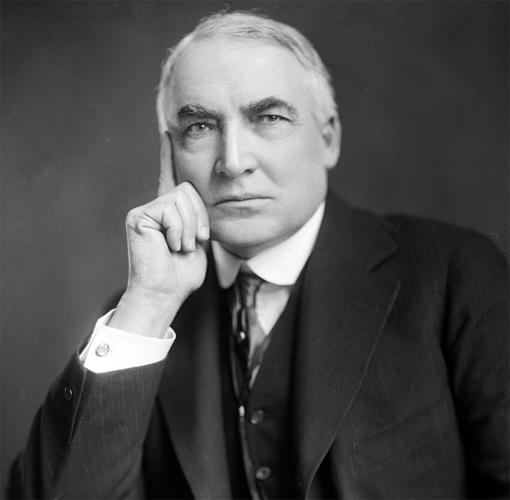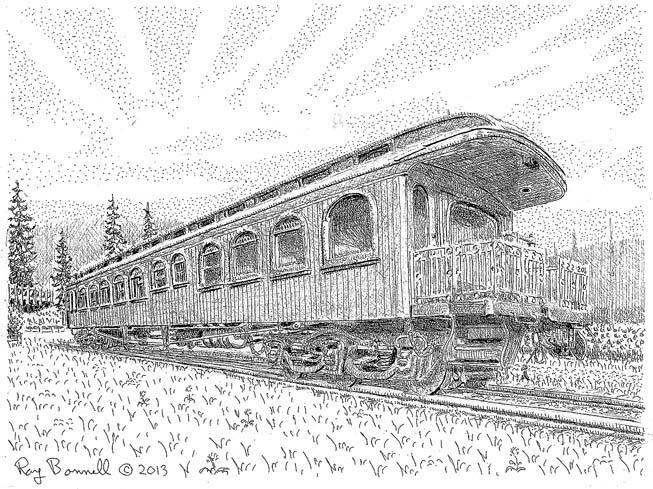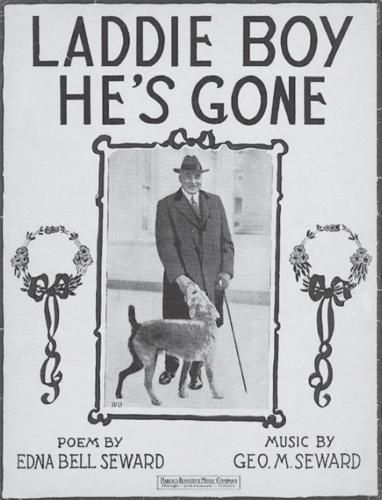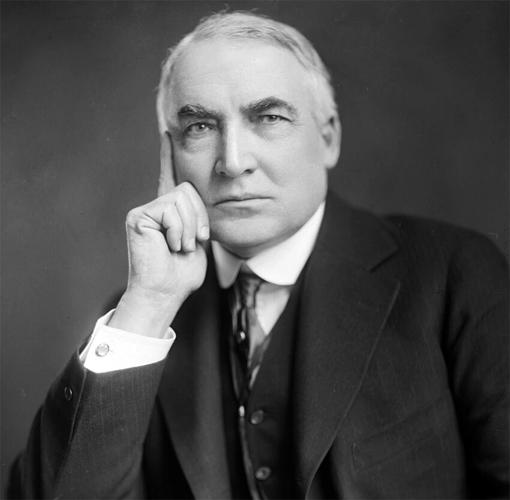President Warren G. Harding’s historic 1923 “Voyage of Understanding” visit to Alaska shortly before his untimely death is well documented. He drove the golden spike to celebrate the Interior Alaska Railroad’s completion, and he visited Mount McKinley (now named Denali) and playfully took control of a train’s engine with the blessing of the engineer.
Less well known, President Harding visited Fairbanks on July 16, 2023, to deliver a speech three years after the start of Prohibition that he hoped would help him win re-election. He traveled 90 miles over the Richardson Trail to address a huge crowd with a speech that pretty much stuck to platitudes and unctuous praise of Alaska’s citizenry.
Needless to say, the address never came close to rivaling Abraham Lincoln’s Gettysburg Address for eloquence and significance.
He said that the Golden City he had found did not conform to a stereotypical bastion of “roughnecks” and the “itinerant adventurer.” The Fairbanks he so briefly saw was “a home country” governed by “the matchless American woman” that gave the territory’s youngsters an “incomparable childhood.”
He went on to share his opinion that Alaska was a treasured “wonderland” whose resources should be developed by “men of talent, genius and industry.”
Harding was circumspect, knowing his Fairbanks audience wanted self-government and to get out from under the thumb of Washington, D.C. Some things never change.
“I do not think that the government can do it for you, but it probably can be helpful, and it wishes to be helpful,” Harding said. “That is why we are here. We want to know Alaska better from first-hand information and from intimate contact. The knowledge we have acquired has been a revelation, although some of us perhaps thought we knew a great deal before we left Washington. But, whatever the government may wish to do ... I would rather trust the fortunes of Alaska to the sons and daughters of the pioneers here than I would to all the politicians that ever assembled together at any place.”
Not surprisingly, that last quote led to thundering applause on the part of the pioneer sons and daughters. Now that he was on a roll, Harding announced that he was entitled to being the first U.S. president to hold the exalted title of sourdough, mainly because he was then the only U.S. president ever to step foot on Alaska terra firma.
Following the speech, Mayor Thomas A. Marquan put the president in a spot, asking the large gathering to raise hands if they wanted the federal government to relinquish control of Alaska’s railroad. The show of hands seemed unanimous opposing putting the railroad into private hands lest it become a monopoly. (See correction below). Marquan then gifted the president an ornate collar made of gold nuggets for Harding’s Airedale terrier, Laddie Boy.
Later that first night here, after delighting pressmen by setting type at the Fairbanks paper, President Harding watched a baseball game that began at 9:20 p.m. and ended at midnight.
Harding went to California following his visits to Juneau, Fairbanks, Nenana and McCarthy. On Aug. 2, 1923, the 57-year-old president died while staying at a San Francisco hotel. Mrs. Harding refused to allow an autopsy.
Vice President Calvin Coolidge succeeded Harding. Mrs. Harding gave Laddie Boy to one of her husband’s Secret Service agents. The Airedale died at age 8 on Jan. 23, 1929.
Harding’s death saddened the nation for his popularity reigned at high pitch due to his eloquence in public talks such as those in Fairbanks and Nenana. Following his death, corruption scandals in his Cabinet and the Department of the Interior darkened his legacy. Documented affairs with at least seven women provoked crude jokes on Capitol Hill about his personal life.
If there was one good thing to say about the dead, it was Harding’s love for dogs. “The popularity of the dog in Alaska is, I think, one of the reasons I like the Territory so well,” he said on July 16, 1923, in his second Fairbanks talk at the now-demolished Masonic Hall. “I took an oath before one of the pioneer secret orders the other day never to kick a dog. I like that spirit and I admire those who are unwilling to kick a dog. I like dogs, and I was pleased to hear what the mayor (Marquam) said about Laddie Boy’s courage, confidence, trust, and fidelity.”
He went on to say that a former dog had died, and Mrs. Harding feared accepting Laddie Boy lest he too pass away before she did.
“Mrs. Harding did not want to have a renewed attachment that must inevitably be broken because of the short life of the dog,” Harding told the audience. “However, I thought the president ought to have a little authority and so I insisted on receiving Laddie Boy.”
Laddie Boy’s gold nugget collar reposed for many years in the Warren G. Harding historic home in Marion, Ohio, until it was stolen in 2012. To this day, no one has ever claimed a $1,000 return for its return.
Warren Harding and I had one thing in common — our size 14 shoes.
Harding claimed he never kicked a dog, but I think I know where he’ll plant that size 14 foot if he ever runs into the collar thief in the Great Beyond.
Editor's note: This article was updated July 17, 2023. Correction below:
In my July 16 column on Warren G. Harding's visit to Fairbanks, I referred to Mayor Marquam asking a large assembled crowd if it wanted the government to return control of the railroad. My sources were speeches and addresses that President Harding delivered during the course of his tour from Washington, D.C. to Alaska to San Francisco, June 20 to Aug. 2, 1923, and a photo caption story by D. L. Hollandy, "President Harding Tour" in the online archive of California (oac.cdlib.org). The OAC stated: "Mayor Marquan of Fairbanks asking people before Harding and officials if they want the government to return control of the railroad to signify by raising right hand, which they all did."
However, that OAC is incorrect or I interpreted it incorrectly and should have consulted newspaper coverage of the day.
A firsthand newspaper account that day stated: "The crowd also cheered when Mayor Marquam of Fairbanks declared the people would fight to a finish to prevent leasing of the government railroad from Seward to Fairbanks to private interests. He declared it would mean eventual monopolization of coal, gold, silver, fisheries and other sources by private capital."
In other words, the Fairbanks audience did not want the railroad privatized lest it become a monopoly.
My OAC source clearly is incorrect. I stand humbly corrected and thank journalist Dermot Cole for the catch.















